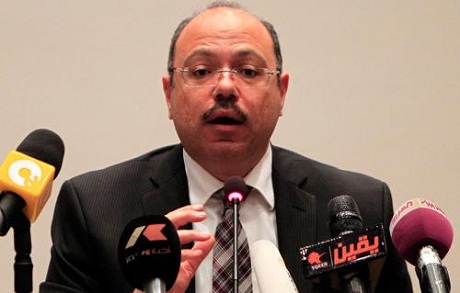
(File Photo) Egyptian Finance Minister Hani Qadri (Photo:Al-Ahram)
Egypt has prepared a medium-term economic plan that targets a six percent growth rate by fiscal year (FY) 2018/19, the Finance Minister Hany Qadry told European ambassadors in Egypt.
Qadry told the head of the EU delegation to Egypt and ambassadors of various European states that the target will be achieved by investing in development projects through partnerships with the private sector, according to a statement released by the ministry on Friday.
Egypt's GDP grew just 2.2 percent in FY 2013/14, a year that saw ongoing violence and instability after the ouster of president Mohamed Morsi in July 2013.
In July 2014, President Abdel-Fattah El-Sisi took office after being elected by 97 percent of voters on the promise of attaining political stability and economic prosperity.
The government is also targeting cutting down the budget deficit to 8-9 percent of GDP by FY 2018/19 from 12.6 percent in FY 2013/14, according to the medium term macroeconomic plan.
The plan, which was released earlier this week by the finance ministry for the five year period from FY 2014/15 to FY 2018/19, also targets debt to GDP ratio to become 80-85 percent by FY 2018/19 after soaring to 97 percent in FY 2013/14 on the back of Gulf aid.
Egypt's ailing economy has depended on aid from Gulf allies since the uprising in 2011, with Saudi Arabia, Kuwait and the UAE pledging $12 billion in the year since Morsi's ouster following mass protests.
According to the release, these targets would be achieved by fiscal consolidation and private sector investments.
The bold move to cut fuel subsidies was taken by the popular president in July but was followed by a raise in interest rates to mitigate inflation.
"The inflation rate will gradually fall within the Central Bank of Egypt’s single digit comfort zone, as prudent monetary policies are maintained and supply-side bottlenecks (energy, transport, and distribution) are addressed," stated the release on medium term macroeconomic policy.
Revenues are also expected to increase following the introduction of new taxes -- the value-added tax (VAT), a temporary income tax for the wealthy and a capital gains tax.
The government is taking steps to encourage investments by reforming the laws with a unified investment law anticipated ahead of an economic summit expected to be held on 21-22 February.
Short link: